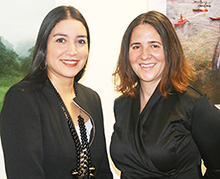
Cognitive remediation after any kind of brain injury — whether from trauma, stroke, surgery, or other event — has been shown to be valuable in helping patients regain function.
At the Weill Cornell Medicine Brain and Spine Center, we place a high priority on treating the whole patient. Although we are a neurosurgical department, it is important to us that we offer our patients related services they need for the best possible outcome. That’s why many of our patients, whether they’ve had a cerebrovascular accident such as a stroke, suffered a traumatic injury, or have undergone neurosurgery, are referred to us for cognitive remediation. Just as speech or physical therapy can help a patient regain abilities in those areas, cognitive remediation helps a patient regain cognitive function.
In neuropsychology we break down cognitive functions into different domains, including attention, memory, language, visual spatial functioning, and executive functioning. Any or all of those domains may be affected by an injury to the brain, and deficits in one domain affect functioning in others. These changes and deficits can contribute to difficulties in a variety of daily tasks at home, work, or school. Using the concept of neuroplasticity – the brain’s ability to rewire itself when needed – neuropsychologists can greatly improve a patient’s outcomes.
There are two aspects of cognitive remediation:
Every brain injury is different, but the most commonly affected domains are attention, memory, and executive function – all of which are critical to carrying out basic tasks.
Attention
The attention domain includes several functions that, when compromised by injury, can make it difficult to accomplish everyday tasks:
Cognitive remediation includes attention training that provides stimulation for all these aspects of attention. The repetitive nature of these drills expedites the process of establishing new neural organization. For the patient, attention training can provide:
Memory
This domain includes several discrete steps required to form and retrieve a memory:
None of this happens automatically, and remediation teaches an individual a strategy for organizing information based on meaning and associations. Association involves anchoring an item to be remembered to an existing related memory or idea. We also teach patients a metacognitive strategy of organizing retrieval of information specifically for words – an inner script to follow when they run into difficulty that involves semantic searching and phonetic searching.
Executive Function
This domain is what allows us to organize tasks into steps, unconsciously for simple tasks and more consciously for more complicated ones. Executive function includes:
Someone with deficits in this domain usually has difficulty breaking a task into steps, knowing where to start, and formulating efficient steps for the task. They are often unaware of errors and have difficulty integrating multiple pieces of information. They are also impulsive, and have an impaired ability to anticipate consequences of their behavior. Cognitive remediation teaches these individuals a problem-solving strategy in which they learn to approach any given problem in a systematic manner by going through a four-step process we call SWAP:
The strategies and treatments of cognitive remediation work, and we feel strongly that neuropsychological treatment should be incorporated into the standard of care. We are proud to be the only facility in New York City that integrates cognitive remediation into the neurosurgical team. We believe this is a benefit not only for patients after a brain injury, cerebrovascular accident, or neurosurgery, but also for those with epilepsy and other chronic neurological conditions such as multiple sclerosis and Parkinson’s disease, to expedite recovery and improve quality of life.
More about our Cognitive Remediation Program